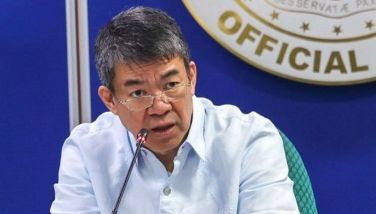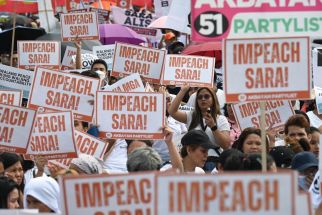A good man, a great Pope
April 5, 2005 | 12:00am
I have long wondered whether popes are entitled to a special reception in Heaven. Does the Vicar of Christ and the successor of St. Peter get a special reception at the gates of Heaven, headed perhaps by St. Peter himself, a choir of angels and a reception committee made up of all the Saints that the decedent has canonized throughout his papacy?
If so, that would mean a pretty large entourage St. Peter would have to have with him in greeting Pope John Paul II, since the recently departed Pontiff granted sainthood to over 200 individuals during his reign, the biggest number by any pope in history. But judging by the praises now being lavished on John Paul II, it is possible he will be met not only by these Saints but by all the heavenly hosts. And, in my humble view, he would deserve such an honor.
On the other hand, I am not sure Karol Josef Wojtyla would want such an honor. Although reputed to be a consummate politician, he disliked surrounding himself with the trappings of his office and preferred spending hours each day in solitary prayer and contemplation or engaged in writing the philosophical and theological tracts he left to the world as part of his legacy.
In my lifetime I have witnessed the passing of five popes while in office: Pius XII, John XXIII, Paul VI, John Paul I and, now, John Paul II. Pius XII became the most controversial in death because of criticisms of his inaction or, some would allege, his complicity in Nazi atrocities against the Jews. John Paul is the most revered because of the ecumenical movement he spurred which essentially revolutionized and modernized the Church in certain fundamental ways.
John Paul I died after only 33 days in office, an event which some argue was the Holy Spirit’s way of telling the Cardinals God didn’t want another Italian in the papacy. Whether that is true or not, Wojtyla was chosen and took the name John Paul II to signify his continuing commitment to the reforms begun by his three immediate predecessors.
John Paul II remained in office for almost 27 years, longer than most other popes. In that time, he has clearly left his mark. Some find that legacy somewhat paradoxical. On the one hand, he is credited with hastening the fall of communism in his homeland Poland, with spreading his brand of the papacy to about 129 countries around the world which he personally visited, with improving diplomatic relations with more countries than any previous pope, and with addressing historic rifts with Muslims, Jews and estranged Christian churches. In 2000, he visited Israel and prayed before the Wailing Wall in Jerusalem, Judaism’s holiest shrine.
He humbled himself by, according to Kenneth Woodward of Newsweek Magazine, issuing a "series of unprecedented papal apologies – to Jews for centuries of Christian anti-Semitism, to Protestants for the Catholic Church’s role in the post-Reformation wars of religion and to the world at large for ecclesiastical arrogance like the Church’s disciplining of Galileo." Those apologies embarrassed some Cardinals, Woodward says, particularly those who believed the Church "was owed a few apologies as well." That never seemed to deter John Paul II.
But there was a different face that Pope John Paul II projected too, one that revealed a deeply conservative streak in doctrinal matters. For instance, he reaffirmed the rule of celibacy for priests and denied priesthood to women, even in the face of liberal pressure to "modernize" and address the worsening problem of declining numbers of priests all over the world.
He supported the suppression of "liberation theology" in Latin America, and opposed "reformist" or left-leaning tendencies in Catholic theology and practice. He famously suspended the constitution of the Society of Jesus for two years, and made clear his sympathy for conservative movements such as the Opus Dei. With German Cardinal Joseph Ratzinger, head of the powerful Congregation for the Doctrine of the Faith, as the Vatican’s veritable doctrinal hit man, he brooked no dissent from the orthodoxy he felt it was his mission to preserve.
John Paul II was steadfast in promoting what he called a "culture of life," refusing to bend not only on abortion as a population planning tool, but also on contraception. While many non-Western countries agreed with his stand on abortion, his view of the unacceptability of population planning means other than ‘natural" methods put him at odds even with Catholics and some members of the clergy concerned with endemic problems of poverty.
The seeming paradoxes in John Paul’s acts and teachings only underscore how difficult it is to label Church leaders as liberal or conservative, reformist or traditional. While some may be "liberal" in certain respects, such as demonstrating openness rather than open hostility to other religious faiths, the Church seems to be hunkering down in most doctrinal matters and, despite reports of dwindling priestly vocations, declining Church attendance and the growing influence of charismatic groups, is refusing to budge in what it deems to be the basic teachings of Christ, good and valid for any time or circumstance.
The next pope, whoever he may be, is not expected to stray too far away from the paths shown by his four immediate predecessors. Whether Italian or not, it will be a conservative that will sit in St. Peter’s throne after the next consistory of Cardinals.
But the images of John Paul II’s papacy are not likely to dissipate anytime soon. His unique and special rapport with the youth of the world, his obvious love for the poor and the oppressed, his insistence on the necessity that all the faithful respect life, whether that of an unborn fetus or of a Terri Schiavo, his forgiveness of his would-be assassin Mehmet Ali Agca, his televised admonition of a kneeling Father Ernesto Cardenal for serving in the Sandinista government in Nicaragua: all these, among many others, are seared into my memory.
He was, at bottom, a good and holy man who was convinced he knew Christ’s teaching, as well as his authority and duty to spread that teaching throughout the universal Church. Despite the debates that remain after his death, this was a great Pope.
If so, that would mean a pretty large entourage St. Peter would have to have with him in greeting Pope John Paul II, since the recently departed Pontiff granted sainthood to over 200 individuals during his reign, the biggest number by any pope in history. But judging by the praises now being lavished on John Paul II, it is possible he will be met not only by these Saints but by all the heavenly hosts. And, in my humble view, he would deserve such an honor.
On the other hand, I am not sure Karol Josef Wojtyla would want such an honor. Although reputed to be a consummate politician, he disliked surrounding himself with the trappings of his office and preferred spending hours each day in solitary prayer and contemplation or engaged in writing the philosophical and theological tracts he left to the world as part of his legacy.
In my lifetime I have witnessed the passing of five popes while in office: Pius XII, John XXIII, Paul VI, John Paul I and, now, John Paul II. Pius XII became the most controversial in death because of criticisms of his inaction or, some would allege, his complicity in Nazi atrocities against the Jews. John Paul is the most revered because of the ecumenical movement he spurred which essentially revolutionized and modernized the Church in certain fundamental ways.
John Paul I died after only 33 days in office, an event which some argue was the Holy Spirit’s way of telling the Cardinals God didn’t want another Italian in the papacy. Whether that is true or not, Wojtyla was chosen and took the name John Paul II to signify his continuing commitment to the reforms begun by his three immediate predecessors.
John Paul II remained in office for almost 27 years, longer than most other popes. In that time, he has clearly left his mark. Some find that legacy somewhat paradoxical. On the one hand, he is credited with hastening the fall of communism in his homeland Poland, with spreading his brand of the papacy to about 129 countries around the world which he personally visited, with improving diplomatic relations with more countries than any previous pope, and with addressing historic rifts with Muslims, Jews and estranged Christian churches. In 2000, he visited Israel and prayed before the Wailing Wall in Jerusalem, Judaism’s holiest shrine.
He humbled himself by, according to Kenneth Woodward of Newsweek Magazine, issuing a "series of unprecedented papal apologies – to Jews for centuries of Christian anti-Semitism, to Protestants for the Catholic Church’s role in the post-Reformation wars of religion and to the world at large for ecclesiastical arrogance like the Church’s disciplining of Galileo." Those apologies embarrassed some Cardinals, Woodward says, particularly those who believed the Church "was owed a few apologies as well." That never seemed to deter John Paul II.
But there was a different face that Pope John Paul II projected too, one that revealed a deeply conservative streak in doctrinal matters. For instance, he reaffirmed the rule of celibacy for priests and denied priesthood to women, even in the face of liberal pressure to "modernize" and address the worsening problem of declining numbers of priests all over the world.
He supported the suppression of "liberation theology" in Latin America, and opposed "reformist" or left-leaning tendencies in Catholic theology and practice. He famously suspended the constitution of the Society of Jesus for two years, and made clear his sympathy for conservative movements such as the Opus Dei. With German Cardinal Joseph Ratzinger, head of the powerful Congregation for the Doctrine of the Faith, as the Vatican’s veritable doctrinal hit man, he brooked no dissent from the orthodoxy he felt it was his mission to preserve.
John Paul II was steadfast in promoting what he called a "culture of life," refusing to bend not only on abortion as a population planning tool, but also on contraception. While many non-Western countries agreed with his stand on abortion, his view of the unacceptability of population planning means other than ‘natural" methods put him at odds even with Catholics and some members of the clergy concerned with endemic problems of poverty.
The seeming paradoxes in John Paul’s acts and teachings only underscore how difficult it is to label Church leaders as liberal or conservative, reformist or traditional. While some may be "liberal" in certain respects, such as demonstrating openness rather than open hostility to other religious faiths, the Church seems to be hunkering down in most doctrinal matters and, despite reports of dwindling priestly vocations, declining Church attendance and the growing influence of charismatic groups, is refusing to budge in what it deems to be the basic teachings of Christ, good and valid for any time or circumstance.
The next pope, whoever he may be, is not expected to stray too far away from the paths shown by his four immediate predecessors. Whether Italian or not, it will be a conservative that will sit in St. Peter’s throne after the next consistory of Cardinals.
But the images of John Paul II’s papacy are not likely to dissipate anytime soon. His unique and special rapport with the youth of the world, his obvious love for the poor and the oppressed, his insistence on the necessity that all the faithful respect life, whether that of an unborn fetus or of a Terri Schiavo, his forgiveness of his would-be assassin Mehmet Ali Agca, his televised admonition of a kneeling Father Ernesto Cardenal for serving in the Sandinista government in Nicaragua: all these, among many others, are seared into my memory.
He was, at bottom, a good and holy man who was convinced he knew Christ’s teaching, as well as his authority and duty to spread that teaching throughout the universal Church. Despite the debates that remain after his death, this was a great Pope.
BrandSpace Articles
<
>
- Latest
- Trending
Trending
Latest
Latest
Recommended

May 30, 2025 - 4:02pm




























